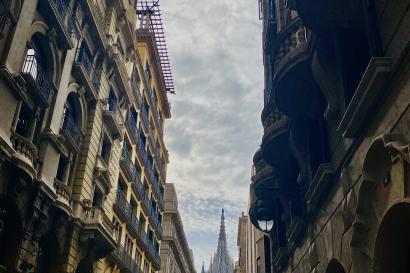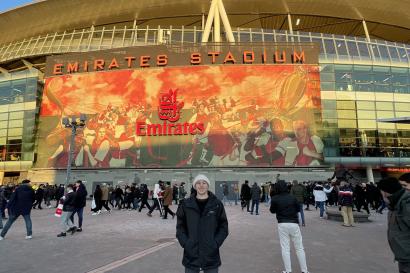We have a midterm tomorrow, so I’ve spent a lot of this weekend studying Spanish grammar. It’s made me think that describing the recent past in any romantic language could become exceedingly difficult. Without enough distance from a past event, it’s hard to have enough perspective to choose the verb form that best conveys the meaning. One might not always know the answers to the key questions used to pick a verb form: Is the event still ongoing or is it over completely? How does it affect the present and future? Is this a fact or is it just a hypothesis?
For example, if I want to write about the water fountains in Barcelona,
there are multiple options:
Nosotros ________________ de las fuentes públicas en Barcelona.
- Bebemos
- Hemos bebido
- Bebíamos
a. We drank from the public fountains in Barcelona.
This structure implies that this action is completely in the past and is not ongoing. Since the water was warm and didn’t taste particularly clean, it certainly won’t be. I am, however, impressed by the sheer number of public drinking fountains in Barcelona. I’ve seen at least one on every major street and at every plaza to which I’ve been. For some reason, I’ve really start to appreciate them since the recent trip I took to Monte Carlo to visit a friend. To the best of my knowledge, the country of Monaco is devoid of public facilities such as drinking fountains, bathrooms, and libraries as sort of a nationwide deterrent to keeping less than affluent visitors who can’t afford the expensive hotel rooms from overstaying their welcome. The people of Barcelona, in contrast, receive foreigners very welcomingly. They will give you directions if you ask them and many speak English. In addition, the city is laid out such that most popular areas have public restrooms, a tourism information desk, and, again, a public drinking fountain.
b. We have drunk from the public fountains in Barcelona.
This structure puts more emphasis in having gained the experience than having completed the action. The experience itself may be more important in this case, since the public fountain, La Font de Cantaletes, is a notable historical sight in Barcelona. The FCBarcelona football team used to meet fans there to celebrate after winning games, and fans still gather there after big matches. It’s said that if one drinks the water from that fountain, he will inevitably return to Barcelona one day. Many of the fountains located around the city are replicas of that fountain which itself is a replica of an older one.
c. We drank from the public fountains in Barcelona.
This sentence is similar that of a, but this one does not imply that the action has stopped. Using the imperfect implies that we may still be going to drink from the public fountains of the city. Also, I haven’t been able to get a consensus on whether or not the water from those fountains is actually safe to drink. It seems to be a highly contested issue among the citizens to whom I’ve talked with about it.
This form does have one more use. It’s equivalent to the conditional:
Si bebieras la agua de las fuentes públicas, sin duda volverías (o volvía) a Barcelona.
I don’t know which if these is most accurate, so needless to say, I’ll need to review the differences more for my midterm.

Alexander Johnson
<p>I am a student at Northwestern University student studying Electrical Engineering, Spanish, and Japanese. This summer, I will be experiencing the great city of Barcelona, Spain and reporting back on all my wonderful findings right here. I hope to inspire a few people to try adventuring out of there comfort zone, too.</p>







